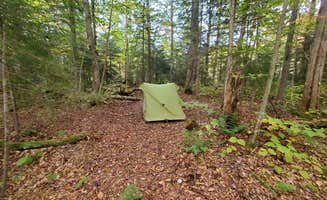Dispersed camping options near Morrisonville, New York extend throughout the Adirondack region across varying elevations from 1,500 to 3,000 feet. Winter closures affect most primitive sites from late October through April, with snow often lingering at higher elevations into May. Road conditions deteriorate significantly during spring thaw when frost heaves and mud create challenging access situations.
What to do
Paddle accessible waters: At Polliwog Lake, campers can launch kayaks or canoes directly from several shore-accessible campsites. The small lake connects to a network of navigable streams during higher water periods from late spring through early summer.
Wilderness hiking: Primitive sites near Ward Brook Campsite provide direct access to numerous unmarked trails. Experienced hikers can connect to the marked Seymour Mountain trail system, with one camper noting: "Great campsite at the bottom of Seymour mountain."
Wildlife observation: Seasonal wildlife viewing opportunities peak during dawn and dusk hours. Early morning provides optimal conditions for spotting deer, small mammals, and various bird species. Bring binoculars and maintain appropriate food storage protocols as black bears actively patrol the area during summer months.
What campers like
Seclusion from crowds: The forest roads leading to Lincoln Dispersed Camping create natural buffer zones from other visitors. A camper described the area as "a sanctuary" where "you can find some beautiful secluded campsites - Yards away from gorgeous running water."
Water features: Natural water access ranks highly among visitor priorities. Many dispersed sites position campers near streams or ponds for filtering water. One camper at Lincoln Dispersed Camping mentioned an "Easy stroll to a clean brook for filtering water," while others appreciated the proximity to cooling water during summer heat.
Tree coverage: Dense forest canopy provides natural cooling during summer months. Mature trees at many sites create ideal hammock setups, with one visitor noting "Great trees for hammocks." The pine forests surrounding many sites offer natural wind protection and create sound barriers between camping areas.
What you should know
Primitive conditions: No services exist at most dispersed sites. All water requires filtering or treatment before consumption. Pack out all waste and supplies as trash collection points are located only at designated campgrounds.
Road accessibility: Many access roads require high-clearance vehicles, particularly after rainfall. At Moscow Recreation Park, campers find "Quiet spot out of the way. Large sporting field car park suitable for big dogs." Roads to Lincoln Dispersed Camping require vehicles with adequate clearance as it "is a somewhat primitive road - lots of big puddles."
Preparation requirements: Cell service remains unreliable throughout the region. Download offline maps before arrival and carry physical backups. Food storage requires bear-resistant containers or vehicle storage at night. Weather conditions change rapidly, requiring appropriate layering systems even during summer months.
Tips for camping with families
Safety planning: Establish clear boundaries for children at water-adjacent sites. Bring extra clothing and footwear as young explorers frequently encounter wet conditions. Define meeting points and provide whistles for communication.
Comfort considerations: Sites at Mountain Pond Road offer relatively flat terrain for tent setup compared to other dispersed options. Morning sun exposure varies significantly between sites, affecting tent warming times and early risers' comfort levels.
Activity options: Pack simple exploration tools like magnifying glasses, wildlife identification cards, and star charts. Natural materials for craft projects abound throughout the area. Morning dew creates ideal conditions for spotting spider webs and intricate forest floor details that engage curious young minds.
Tips from RVers
Size limitations: Most dispersed camping areas accommodate only smaller RVs under 25 feet due to tight turning radiuses and low-hanging branches. Jones Pond access roads limit larger rigs but provide more level parking areas than most alternatives.
Leveling challenges: Bring extra leveling blocks as most sites feature natural slopes. Advance scouting by foot before driving rigs down unmarked roads prevents difficult extraction situations. Allow extra setup time as finding optimal positioning often requires multiple adjustments.
Resource conservation: Water tank capacity determines stay duration as no refill stations exist at dispersed sites. Solar charging systems perform inconsistently under dense tree coverage. Propane consumption increases at higher elevations where cooler nighttime temperatures persist even during summer months.



